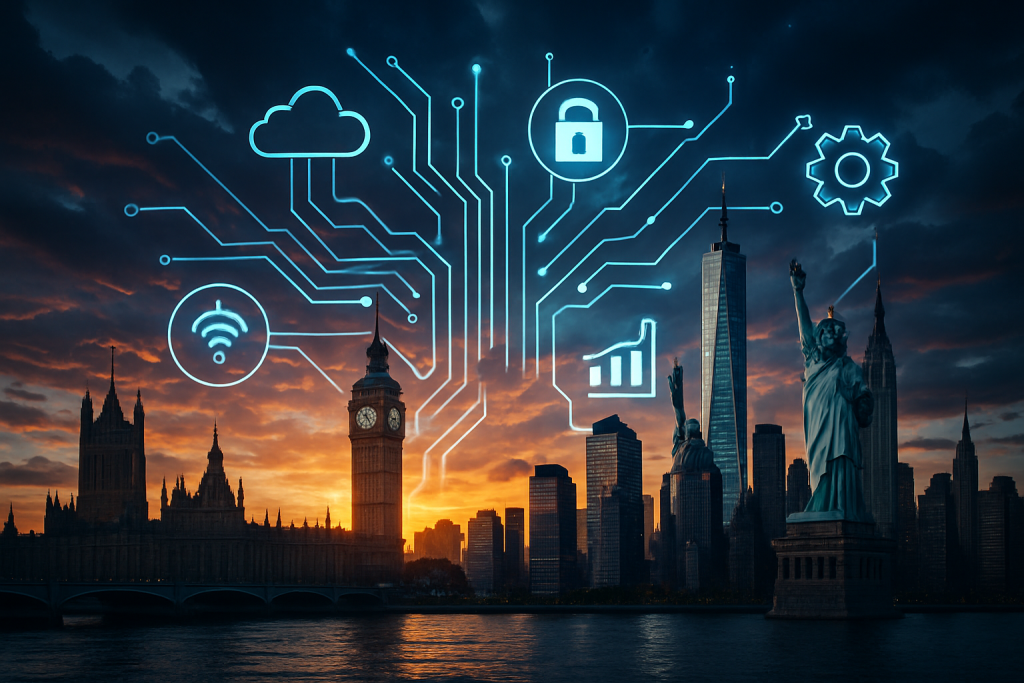The air crackled with anticipation, a palpable buzz echoing from Silicon Valley to Shoreditch. News broke yesterday that the United Kingdom and the United States are poised to ink a multibillion-dollar technology agreement during President Trump’s upcoming state visit to the UK. Forget tea and crumpets; this visit is all about bits and bytes, forging a transatlantic alliance in the high-stakes game of emerging technologies. Think “Avengers: Endgame,” but instead of battling Thanos, it’s about dominating the future of AI, semiconductors, telecommunications, and quantum computing.
UK Technology Secretary Liz Kendall didn’t mince words, declaring that these “cutting-edge technologies such as AI and quantum computing will transform our lives.” It’s a bold statement, but one that reflects the growing consensus that these technologies are not just buzzwords, but fundamental building blocks of tomorrow’s world. It’s like when Tony Stark first unveiled the arc reactor- a game-changer, a paradigm shift.
President Trump’s three-day visit, kicking off next Tuesday, isn’t just a photo op with the Royal Family. It’s a strategic summit, a meeting of minds (and wallets) with some of the biggest names in tech. Nvidia CEO Jensen Huang, the rockstar of GPUs and AI acceleration, will be there. So will OpenAI’s Sam Altman, the man trying to build Skynet without, you know, *actually* building Skynet. These aren’t just advisors; they’re key players in this high-stakes drama.
And speaking of wallets, investment behemoth BlackRock is reportedly planning to pump $700 million into UK data centers. That’s not pocket change; that’s a serious commitment to building the infrastructure needed to power this technological revolution. It’s like investing in the railroads during the industrial revolution, or laying the transatlantic cable in the 19th century. This is about laying the foundation for a new era.
But why now? What’s driving this sudden surge in transatlantic tech diplomacy? The answer lies in a complex interplay of factors, from geopolitical competition to economic opportunity. Both the US and the UK recognize that they can’t go it alone in the race to dominate these emerging technologies. They need each other. It’s a classic case of “strength in numbers,” a realization that collaboration is key to staying ahead of the curve.
This agreement isn’t happening in a vacuum. It’s the culmination of years of growing collaboration between US and UK tech companies. OpenAI has been steadily expanding its operations in London, while DeepMind, the UK-based AI powerhouse owned by Google, has been deepening its ties with American counterparts. Both nations have also published AI Action Plans earlier this year, signaling a shared commitment to fostering innovation and responsible development in the field.
But what are the implications of this agreement? Who stands to benefit, and who might be left behind? Let’s dive a little deeper.
The Winners and Losers (Maybe)
On the surface, it seems like a win-win for everyone involved. US tech companies gain access to the UK’s talent pool and research ecosystem, while UK companies get a boost from American investment and expertise. Consumers on both sides of the Atlantic should benefit from faster innovation and lower prices, or at least that’s the theory.
But there are potential downsides. Some worry that the agreement could lead to a concentration of power in the hands of a few large tech companies, stifling competition and innovation in the long run. Others are concerned about the ethical implications of these technologies, particularly AI, and the need for strong regulatory frameworks to ensure that they are used responsibly. Remember the cautionary tales from “Black Mirror?” We need to be mindful as we move forward.
And then there’s the question of national security. These technologies are not just economic assets; they’re also strategic weapons. The agreement could strengthen the US and UK’s position in the global balance of power, but it could also raise concerns among other nations about the potential for technological dominance. It’s a delicate balancing act, a high-wire act with potentially far-reaching consequences.
The Political and Societal Fallout
This agreement is likely to fuel further debate about the role of government in regulating technology. Some argue that governments should take a hands-off approach, allowing innovation to flourish without undue interference. Others believe that governments have a responsibility to protect consumers, promote competition, and ensure that these technologies are used for the benefit of society as a whole.
The debate over AI regulation is particularly heated. Some worry that AI could lead to job displacement, algorithmic bias, and even the erosion of human autonomy. They call for strong regulations to prevent these harms and ensure that AI is used ethically and responsibly. Others argue that overregulation could stifle innovation and prevent AI from reaching its full potential. They advocate for a more flexible and adaptive approach to regulation, one that allows for experimentation and learning.
The agreement also raises broader questions about the future of work, the nature of human intelligence, and the very definition of what it means to be human. As AI becomes more powerful, it will challenge our assumptions about what we are capable of and what we value. It will force us to confront fundamental questions about our place in the world.
The Financial and Economic Earthquake
The financial implications of this agreement are staggering. The multibillion-dollar investment will create jobs, boost economic growth, and drive innovation in both the US and the UK. But it could also exacerbate existing inequalities, creating a divide between those who have the skills and resources to thrive in the digital economy and those who are left behind.
The agreement is likely to have a ripple effect throughout the global economy, impacting industries ranging from manufacturing to healthcare to finance. It could lead to new business models, new products, and new services that we can’t even imagine today. It could also disrupt existing industries, leading to job losses and economic upheaval.
The stock markets are already reacting to the news, with shares of AI-related companies soaring. Investors are betting that this agreement will accelerate the growth of the AI industry and create new opportunities for profit. But as with any technological revolution, there are risks involved. The AI bubble could burst, leaving investors with huge losses. Or the technology could be used in ways that are harmful to society, leading to a backlash against the industry.
Ultimately, the success of this agreement will depend on how well we manage the risks and harness the opportunities. It will require careful planning, strong leadership, and a commitment to ethical and responsible innovation. It will also require a willingness to engage in open and honest dialogue about the challenges and opportunities that lie ahead.
As President Trump jets across the Atlantic, he carries not just the weight of diplomatic responsibility, but the hopes and fears of a world on the cusp of a technological revolution. The UK-US tech agreement is more than just a deal; it’s a statement of intent, a declaration that these two nations are ready to lead the way into the future. The only question is: will that future be a utopia or a dystopia? Only time will tell. But one thing is certain: the ride will be anything but boring.
Discover more from Just Buzz
Subscribe to get the latest posts sent to your email.


